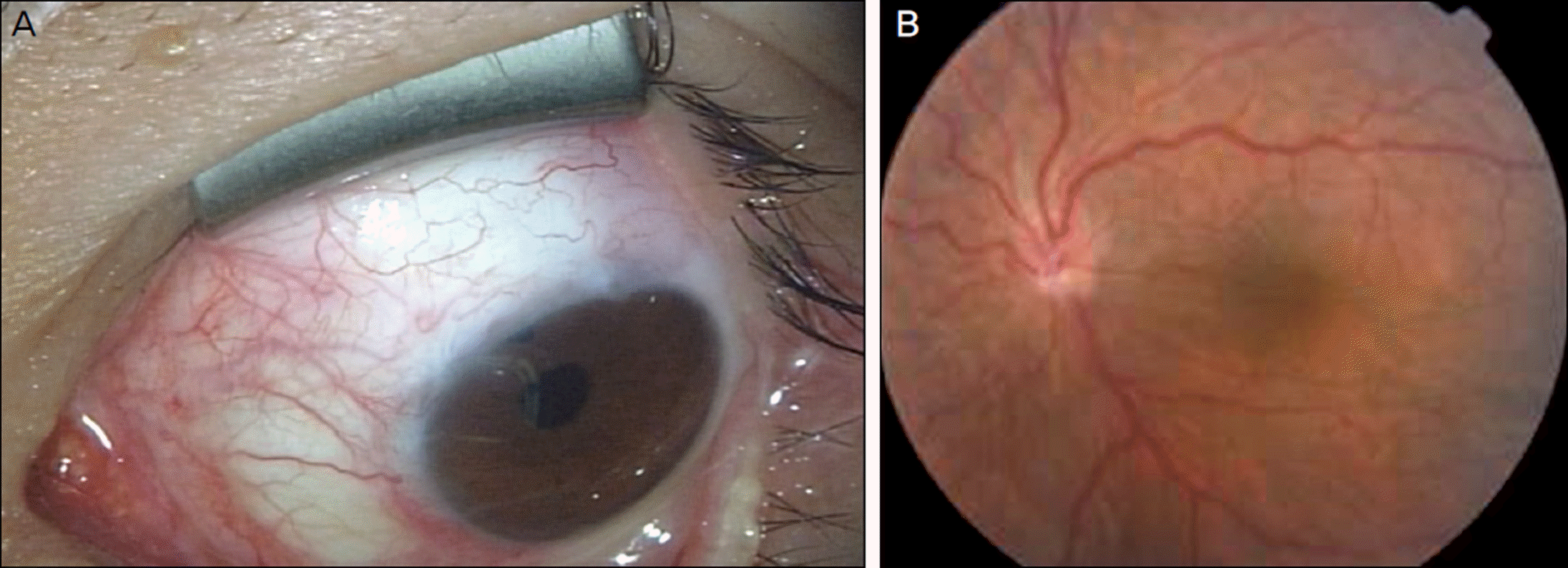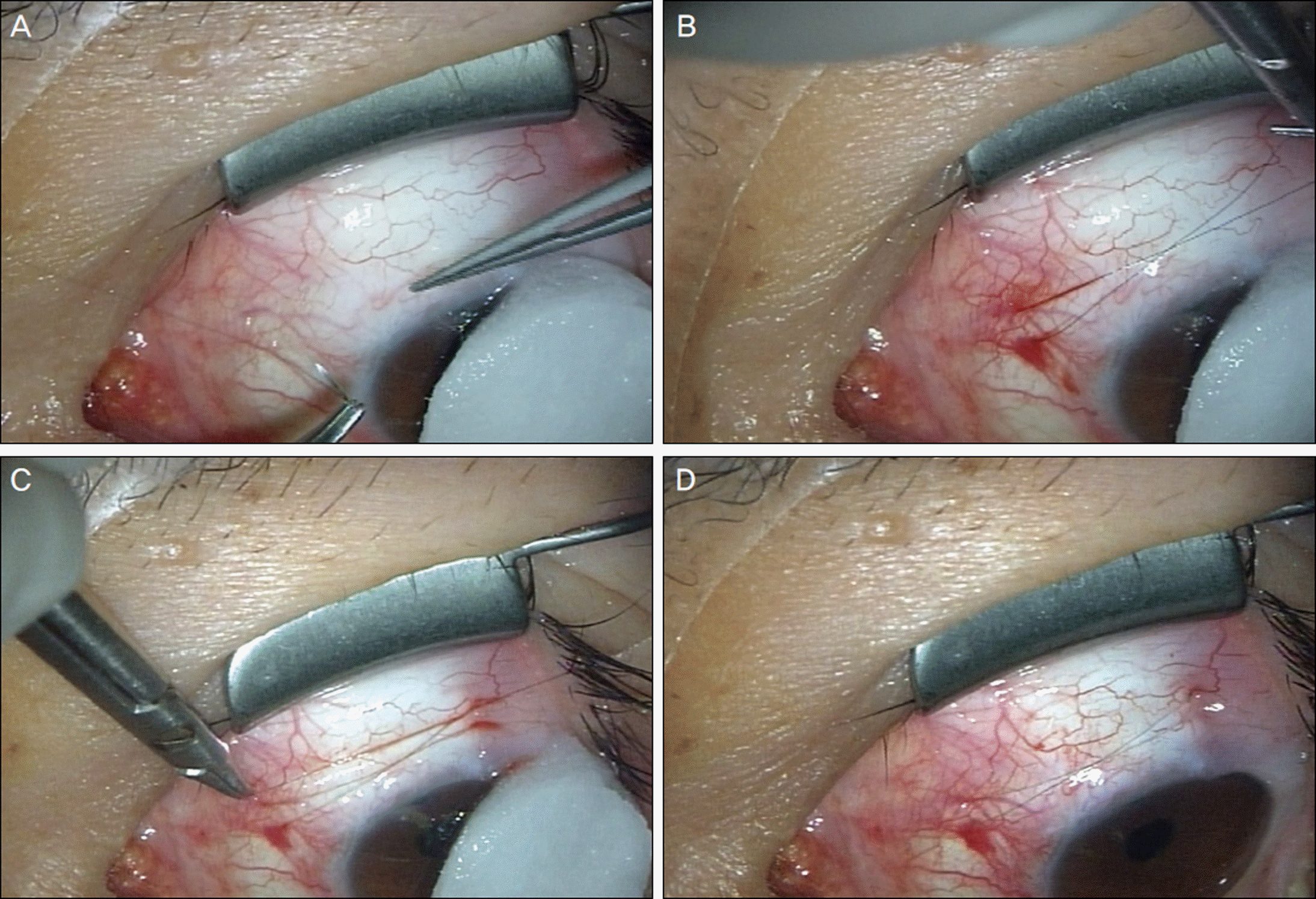Abstract
Purpose
To evaluate the usefulness of external bandage suture for bleb-related management that follows trabeculectomy with mitomycin C.
Methods
External bandage sutures were performed on 10 patients having hypotony maculopathy, persistent low intraocular pressure (IOP) caused by either hyperfiltration or focal leakage, or a persisting large bleb caused by hyperfiltration and who received trabeculectomy using mitomycin C as an adjuvant treatment. The changes in IOP measured before and 4 weeks after the procedure along with complication incidences were evaluated.
Results
The mean IOP 4 weeks after the procedure compared with the mean IOP prior to the procedure increased from 5.8 ± 2.0 mm Hg (3.0-9.0 mm Hg) to 14.1 ± 8.5 mm Hg (4.0-32.0 mm Hg), with statistical significance (p = 0.008). After the procedure, improvement in visual acuity was observed but without statistical significance. One patient had persistent focal leakage from an avascular bleb and conjunctival advancement with removal of the avascular conjunctiva was performed. Conclusions: An external bandage suture can be a good alternative for correction of post-trabeculectomy hypotony and severe chemosis with minimal effect on blebs while correcting focal leakage and hyperfiltration.
References
1. Palmer SS. Mitomycin as adjunct chemotherapy with trabeculectomy. Ophthalmology. 1991; 98:317–21.

2. Chen CW, Huang HT, Bair JS, Lee CC. Trabeculectomy with simultaneous topical application of mitomycin-C in refractory glaucoma. J Ocul Pharmacol. 1990; 6:175–82.

3. Jacobi PC, Dietlein TS, Krieglstein GK. Adjunctive mitomycin C in primary trabeculectomy in young adults: a long-term study of case-matched young patients. Graefes Arch Clin Exp Ophthalmol. 1998; 236:652–7.

4. Bindlish R, Condon GP, Schlosser JD, et al. Efficacy and safety of -mitomycin-C in primary trabeculectomy: five-year follow-up. Ophthalmology. 2002; 109:1336–41.
5. Waheed S, Liebmann JM, Greenfield DS, et al. Recurrent bleb infections. Br J Ophthalmol. 1998; 82:926–9.

6. Greenfield DS, Suñer IJ, Miller MP, et al. Endophthalmitis after filtering surgery with mitomycin. Arch Ophthalmol. 1996; 114:943–9.

7. Uhm KB, Lee JS, Kim TW, et al. Hypotony after trabeculectomy with mitomycin. C. J Korean Ophthalmol Soc. 1996; 37:1709–21.
8. Costa VP, Wilson RP, Moster MR, et al. Hypotony maculopathy following the use of topical mitomycin C in glaucoma filtration surgery. Ophthalmic Surg. 1993; 24:389–94.

9. Tomlinson CP, Belcher CD 3rd, Smith PD, Simmons RJ. Management of leaking filtration blebs. Ann Ophthalmol. 1987; 19:405-8. 411.
10. Sugar HS. Treatment of hypotony following filtering surgery for glaucoma. Am J Ophthalmol. 1971; 71:1023–33.

11. Smith MF, Magauran RG 3rd, Betchkal J, Doyle JW. Treatment of postfiltration bleb leaks with autologous blood. Ophthalmology. 1995; 102:868–71.

12. Leen MM, Moster MR, Katz LJ, et al. Management of overfiltering and leaking blebs with autologous blood injection. Arch Ophthalmol. 1995; 113:1050–5.

13. Fourman S, Wiley L. Use of a collagen shield to treat a glaucoma filter bleb leak. Am J Ophthalmol. 1989; 107:673–4.

14. Hennis HL, Stewart WC. Use of the argon laser to close filtering bleb leaks. Graefes Arch Clin Exp Ophthalmol. 1992; 230:537–41.

15. Blok MD, Kok JH, et al. Use of the Megasoft Bandage Lens for treatment of complications after trabeculectomy. Am J Ophthalmol. 1990; 110:264–8.

16. Lynch MG, Roesch M, Brown RH. Remodeling filtering blebs with the neodymium: YAG laser. Ophthalmology. 1996; 103:1700–5.
17. Zalta AH, Wieder RH. Closure of leaking filtering blebs with cyanoacrylate tissue adhesive. Br J Ophthalmol. 1991; 75:170–3.

18. Gehring JR, Ciccarelli EC. Trichloracetic acid treatment of filtering blebs following cataract extraction. Am J Ophthalmol. 1972; 74:622–4.

20. Hyung SM, Choi MY, Kang SW. Management of chronic hypotony following trabeculectomy with mitomycin C. Korean J Ophthalmol. 1997; 11:15–24.

21. Maruyama K, Shirato S. Efficacy and safety of transconjunctival scleral flap resuturing for hypotony after glaucoma filtering surgery. Graefes Arch Clin Exp Ophthalmol. 2008; 246:1751–6.

22. Letartre L, Basheikh A, Anctil JL, et al. Transconjunctival suturing of the scleral flap for overfiltration with hypotony maculopathy after trabeculectomy. Can J Ophthalmol. 2009; 44:567–70.

23. Grewing R, Mester U. Fibrin sealant in the management of complicated hypotony after trabeculectomy. Ophthalmic Surg Lasers. 1997; 28:124–7.

24. Seligsohn A, Moster MR, Steinmann W, Fontanarosa J. Use of Tisseel fibrin sealant to manage bleb leaks and hypotony: case series. J Glaucoma. 2004; 13:227.
25. Wilson MR, Kotas-Neumann R. Free conjunctival patch for repair of persistent late bleb leak. Am J Ophthalmol. 1994; 117:569–74.

26. Hyung SM, Ahn DG. Midterm follow-up of necrotic bleb excision and advancement of the fornical conjunctiva. Korean J Ophthlmol. 1999; 13:85–91.

27. Hyung SM, Jung MS. Management of hypotony after trabeculectomy with mitomycin C. Korean J Ophthalmol. 2003; 17:114–21.

28. Kim Y, Kim SK, Hyung S. Rotation flap of Tenon's capsule for treating hypotony. J Korean Ophthalmol Soc. 2007; 48:866–72.
29. Morris DA, Ramocki JM, Shin DH, et al. Use of autologous Tenon's capsule and scleral patch grafts for repair of excessively draining fistulas with leaking filtering blebs. J Glaucoma. 1998; 7:417–9.

30. Wadhwani RA, Bellows AR, Hutchinson BT. Surgical repair of leaking filtering blebs. Ophthalmology. 2000; 107:1681–7.

31. Panday M, Shantha B, George R, et al. Outcomes of bleb excision with free autologous conjunctival patch grafting for bleb leak and hypotony after glaucoma filtering surgery. J Glaucoma. 2011; 20:392–7.

34. Maumenee AE. External filtering operations for glaucoma: the mechanism of function and failure. Trans Am Ophthalmol Soc. 1960; 58:319–28.
35. Hata T, Hoshi T, Kanamori K. Mitomycin, a new antibiotic from Streptomyces. I. J Antibiot (Tokyo). 1956; 9:141–6.
36. Kunitomo N, Mori S. Studies on pterygium. Part 4. A treatment of the pterygium by mitomycin-C instillation. Acta Soc Ophthalmol Jpn. 1963; 67:601–7.
37. Chen CW. Enhanced intraocular pressure controlling effectiveness of trabeculectomy by local application of mitomycin-C. Trans Asia Pac Acad Ophthalmol. 1983; 9:172–7.
38. Kim DK, Bae JH, Yoo JM. Revision of failed filtering blebs using mitomycin C. J Korean Ophthalmol Soc. 1999; 40:2852–7.
39. Kitazawa Y, Kawase K, Matsushita H, Minobe M. Trabeculectomy with mitomycin. A comparative study with fluorouracil. Arch Ophthalmol. 1991; 109:1693–8.

40. Sanders SP, Cantor LB, Dobler AA, Hoop JS. Mitomycin C in higher risk trabeculectomy: a prospective comparison of 0.2- to 0.4-mg/cc doses. J Glaucoma. 1999; 8:193–8.
41. Nuijts RM, Vernimmen RC, Webers CA. Mitomycin C primary trabeculectomy in primary glaucoma of white patients. J Glaucoma. 1997; 6:293–7.

42. Scott IU, Greenfield DS, Schiffman J, et al. Outcomes of primary trabeculectomy with the use of adjunctive mitomycin. Arch Ophthalmol. 1998; 116:286–91.

43. Benson SE, Mandal K, Bunce CV, Fraser SG. Is post-trabeculectomy hypotony a risk factor for subsequent failure? A case control study. BMC Ophthalmol. 2005; 5:7.

44. Toris CB, Pederson JE. Aqueous humor dynamics in experimental iridocyclitis. Invest Ophthalmol Vis Sci. 1987; 28:477–81.
45. Bellows AR, Chylack LT Jr, Hutchinson BT. Choroidal detachment. Clinical manifestation, therapy and mechanism of formation. Ophthalmology. 1981; 88:1107–15.
47. Stamper RL, McMenemy MG, Lieberman MF. Hypotonous maculopathy after trabeculectomy with subconjunctival 5-fluorouracil. Am J Ophthalmol. 1992; 114:544–53.

48. Liebmann JM, Sokol J, Ritch R. Management of chronic hypotony after glaucoma filtration surgery. J Glaucoma. 1996; 5:210–20.
Figure 1.
The 43 year old male patient diagnosed with uveitic glaucoma and received trabeculectomy using mitomycin C as an adjuvant. Two weeks after the operation, the patient showed hyperfiltration bleb combined with hypotonic maculopathy (A). Funduscopic view showed tortuous retinal vessels with choroidal fold in the patient's hypotonic eye (B).

Figure 2.
Schematic design of external bandage suture. In case with hyperfiltration, external bandage suture is designed to cross the scleral flap (A). In case with focal leakage, external bandage suture is designed to isolate leakage point with scleral flap (B). In case with hyperfiltration with severe chemosis, external bandage suture is designed to cross transversely from limbus to bleb margin, either 3 or 9 o'clock (C).

Figure 3.
The procedure of external bandage suture in patient with hyperfiltration combined with hypotonic maculopathy (shown in Fig. 1). Under topical anesthesia, patient is directed to look downward. After recognized scleral flap region, external bandage suture is designed to cross scleral flap, and the tension of the suture is controlled by the surgeon. The procedure is performed from (A) to (D).

Table 1.
Baseline demographics of the study population
Table 2.
IOP and BCVA of 10 eyes before and 1 month after mattress suture
Table 3.
Comparison of IOP and BCVA of 10 eyes before and 1 month after mattress suture
| Characteristic | Mean | p-value* | |
|---|---|---|---|
| IOP (mm Hg [range]) | Before suture | 5.8 ± 2.0 (3.0-9.0) | 0.008 |
| 1 month after suture | 14.1 ± 8.5 (4.0-32.0) | ||
| BCVA (log MAR [range]) | Before suture | 0.93 ± 0.64 (0.2-2.3) | 0.31 |
| 1 month after suture | 0.81 ± 0.70 (0.1-2.0) |
Table 4.
Outcomes for 10 eyes after external bandage suture, corrected with age, sex, type of flap, diagnosis and cause of suture




 PDF
PDF ePub
ePub Citation
Citation Print
Print


 XML Download
XML Download